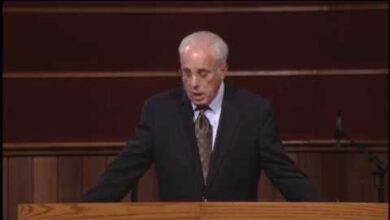John MacArthur: Is Jesus the Only Way?
John MacArthur: Is Jesus the Only Way?
What an incredible privilege it is to be called and sent by God to proclaim His glorious truth. This February marks 40 years of ministry at Grace Community Church. Forty years—what an amazing milestone! I truly appreciate this journey, and we should all applaud those who have persevered in ministry for all these years.
It’s been such a joy, and one of the highlights of my life has been the friendship with R.C. and the opportunity to minister at Ligonier conferences. From many places, including the National Conference in Orlando, to being here with you today, I am honored to be part of this incredible event.
I know you’ve heard a lot already, and there’s more to come today. Let’s begin our morning with a brief Bible study as we spiritually wake up. It’s my favorite thing to do. So, instead of approaching this as a typical sermon, let’s view our time together as an informal gathering to explore the Scriptures.
I want to guide you through Scriptures that focus on the exclusivity of the gospel. One unexpected reality in my life has been that, for many years, I’ve preached countless messages and written numerous books trying to defend the gospel, especially as it faces attacks from so-called evangelicals.
When I was in seminary, we prepared to battle liberalism and defend the inerrancy of Scripture. We learned to address the true ministry of the Holy Spirit, clarify sanctification, and deal with the early movement that became what we now call the ‘charismatic movement.’ We studied issues like countering liberalism, Catholicism, and the cults, but at the time, the gospel seemed like a settled matter in the evangelical world. That is no longer the case, and today, the term ‘evangelical’ has become so ambiguous that it barely carries meaning.
Surveys show that between 45 and 65 percent of self-identified evangelical Christians believe that Jesus is not the only way to heaven. This is a clear contradiction of our tradition, theology, and Scripture.
As evangelical Christians, we now find ourselves defending the exclusivity of Christ. This movement isn’t diminishing—it’s growing, especially in a postmodern world where tolerance reigns, and everyone is entitled to their own opinions. In this context, there is no universal truth or absolutes, and the gospel’s exclusivity fits perfectly with this worldview. We must be equipped to address these challenges.
Reflecting on my own writings, I’ve authored many books addressing the gospel—The Gospel According to Jesus, The Gospel According to the Apostles, Hard to Believe, The Truth War, Ashamed of the Gospel, and several others. Countless books have been written to clarify the gospel and urge adherence to it, especially if you call yourself a Christian. Yet, there remains widespread ambiguity about the gospel, and many prominent evangelical leaders are complicit in this ambiguity. They leave out the gospel’s precision, presenting a version that’s flexible and easily molded into a form that satisfies personal preferences.
There are things we can get wrong without eternal consequences, but the gospel isn’t one of them. Getting the gospel wrong carries severe eternal consequences. The heart of our faith is the gospel of salvation, and it’s vital to understand it as it truly is in its saving power. True Christians have always believed and taught that without hearing and believing the gospel of Jesus Christ, you cannot be saved from eternal separation from God.
This is the truth consistently affirmed by believers throughout Scripture. Let’s turn to Romans 10 to explore this further. We’ll start by looking at what the Scriptures say about any other attempt to achieve salvation, rather than merely affirming the exclusivity of Christ in a positive light. Let’s approach this from a more negative perspective and dive into what the Bible teaches.
